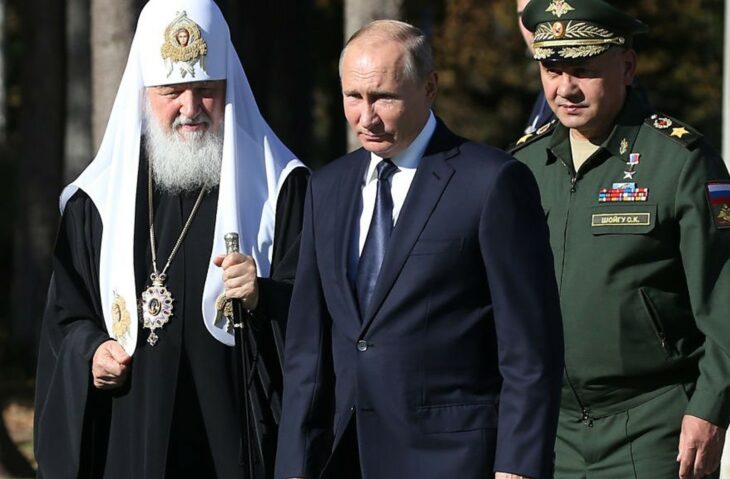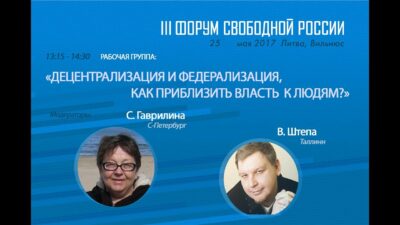
The Russian Orthodox Church has supported Russia’s aggression against Ukraine – everyone knows this today. For some time, hierarchs and church diplomats still tried to say that this was not true – there had not been and would not be any direct statements to that effect. But let’s leave their awkward attempts to vindicate themselves on their conscience. Over the ten months of the war, enough has been said and done not only to understand the position of the Russian Orthodox Church, but also to look further into the complicity of the clergy in war crimes. The key point is the use of pseudo-theological arguments to justify Russian aggression and the genocide of the Ukrainians.
In my opinion, what has been happening in recent months most closely resembles an attempt at suicide by the Russian Orthodox Church. It is inconceivable that in the foreseeable future the ROC will remain as it has been for the past 30 or even 80 years – from the day Stalin decided to end the era of persecution of the Church and allowed it to exist legally in the Soviet Union.
State vs. church
The position of Patriarch Kirill, who claims to express the official position of the entire Church, was puzzling to many – laity and parish priests, the bishops of other local Orthodox Churches and even the Archbishop of Canterbury and the Pope.
Having recovered from the shock, many are trying to analyze what happened. And the main question is why? Why did the Church so sincerely and so clearly support the war? This question has to be asked again and again, as there is no simple answer. However, various commentaries are sure to be offered. The general idea of what the future holds for the Russian Orthodox Church will depend on their contents. We will not discuss in detail those who believe that everything is fine and there is nothing wrong with the ROC being in full agreement with the Kremlin.
But there are at least three other groups.
There are those who are extremely emotional and literally perceive the ROC’s final turn toward the Kremlin as a betrayal. Such people are often sharply disappointed and tend to leave the Church. The secular world rapidly expands to embrace those disappointed. According to my observations, this is happening not only in Russia but also in Ukraine.
There are those who lurk and remain silent. They are depressed both spiritually and emotionally and cannot make a choice. Many of them are physically hurt to hear the name of Patriarch Kirill, who is remembered in every church as “the great lord and father” of all Orthodox Christians in Russia and the former Soviet Union. These words sound too fake to be simply ignored, to be passed over.
But what is to be done? There is no serious alternative, it is impossible to switch to another Church. One can either slam the door and enter secular space, or continue to endure, bitterly admitting to oneself each time in the depths of his heart that the name of Patriarch Kirill is completely hateful.
One can either slam the door and leave the Church or endure, bitterly admitting that the patriarch’s name has become completely hateful
There is a third group that sees a more complex picture and tries to distinguish between the Church that has servilely bowed down to state power and the Church that seeks to bear evangelical truth.
The former is the “official Church”. It feels comfortable only when it is inseparably linked to the state, and it receives both financial and political dividends from preaching an almost religious faith in the empire. Before the war, in terms of prospects, such an arrangement looked incredibly attractive to both the episcopate and the entire church bureaucracy. The bishop in a regional center felt like a “second governor”, and the permanent members of the Supreme Church Council considered themselves almost “A-class” officials. The patriarch at the same time enjoys the company of FSO bodyguards while ranking somewhere among ten top government officials in full conformity with the state protocol.
The bishop in a regional center felt like a “second governor” and the members of the Church Council felt like Class A officials
But what is the “second Church”? It is neither seen nor heard. Is it silent? Gone into internal exile? Is it too small to be seen with the naked eye? There is no exact answer to these questions. The priests I know say that in general, no more than 20% of the parishioners oppose the war, and those with whom the priests can speak frankly are few and far between.
Only a few Orthodox priests, monks and laymen spoke out publicly against the war. It is noteworthy that the anti-war movement does not include any bishops at all. Among those who clearly support aggression there are at least a dozen of them, but among those who openly oppose the war – not a single one.

Can we say that the silence of the episcopate is a verdict on the whole Russian Church? In a sense, yes, but here a caveat is necessary: at first glance, this suggests that 100% of the Russian episcopate demonstrates complete loyalty to the state.
However, it is possible that we should speak of silence as a variant of resistance. It turns out that there are two kinds of silence. How, then, are they to be distinguished? How does silence as consent differ from silence as protest? What other signals might indicate that a bishop’s position is anti-war? I would assume that such signals do exist after all. For example, the willingness not to ban priests who speak out against the war from ministry. Of course, these are isolated cases, and right now it is not worth mentioning those bishops by name. Nevertheless, it is known that there are more than one, two or three of them.
New martyrs as a paragon of piety which rings hollow
For decades, priests and bishops of the Russian Orthodox Church have been preaching about the exploits of the new martyrs and confessors of Russia, whom the Soviet authorities executed, sent to the Gulag, oppressed, and killed by all available means. Could it be that the canonization of more than a thousand saints, the temples built in their memory, and the sermons preached about steadfastness of their faith are but a “theory,” a pious sigh? It seems so. The ROC only superficially, formally honors the memory of those who, inspired by the Gospel, resisted totalitarian rule.
Back in 2011, church functionaries figured out how to take precautions. In the document, which was given the rather unwieldy bureaucratic title “On measures to preserve the memory of the new martyrs, confessors and all innocent victims of the persecution”, there is an important formula for understanding the ideology of the official Church: “The heroic deeds of the new martyrs and confessors testify to their opposition to theomachy, not to the state as such.” As I recall, the author of the formula is Vladimir Legoyda, a MGIMO graduate and chairman of the Synodal Department for Cooperation between the Church and Society and the Mass Media. The formulation was later fervently supported by many, including Patriarch Kirill.
Their credo has been articulated very clearly: no matter what happens, the state cannot be blamed. This is an insidious distortion of the Gospels. But it is precisely on such distortions that the views of the official Church are based. Can this system of views be called heresy? Is it possible to do a theological analysis and, for example, condemn these views as heresy? The question is not as simple as it seems, although we see that there are a number of theologians who, at the very beginning of the war, wrote a “Declaration on the “Russian World” Doctrine”. They offered a conceptual description of the “Russian world”, albeit incomplete, and wanted to dub it as heresy, but softened the wording at the last moment before publication. They used the term “a kind of Orthodox ethnophyletic fundamentalism.” In early December, Ecumenical Patriarch Bartholomew criticized the ROC in the same way but refrained from direct accusations of heresy.
What will happen next? It is possible that the dispute about the new heresy that comes from Russia (whether it will be called the heresy of the “Russian world” or something else) will become a central topic of theological debate at least in the coming year 2023. And this is only logical. The Russian Orthodox Church has replaced the Gospels with a boiling mixture of conspiracy, paganism and imperialism, multiplied by deep Soviet complexes fostering the search for external and internal enemies.
The Russian Orthodox Church has replaced the Gospel with a boiling mixture of conspiracy, paganism and imperialism, multiplied by Soviet complexes
Patriarch Kirill and popular preachers in Russia are trying to dress up this contradictory set of views in church garb, to give them a theological rationale and justification. Russian politicians, in turn, try to play along and use increasingly radical rhetoric, culminating in calls for the “desatanization” of Ukraine.
What will happen to Russian Orthodoxy, which hasn’t put up any resistance against being used as a means of state propaganda?
The consequence of the complete and unconditional justification of the war will be the imminent collapse of the official Church. But the problem is that the official Church claims totality. It itself believes that there is no other Church, and firmly holds in its hands a monopoly on Orthodoxy in Russia.
The consequence of the complete and unconditional justification of war will be the imminent collapse of the official Church
The “Second Church” is likely to go underground and will not publicly oppose the official Church. And this means that today the only hope is on the voice of Orthodoxy, which will be heard from other countries. Is there a chance that local Orthodox Churches will openly state their position and condemn Patriarch Kirill and his “theology of war”? I believe there is a chance of that happening. And it will be an important and necessary step towards the revival of the Russian Orthodox Church.
Sergey Chapnin
Senior fellow, Orthodox Christian Studies Center, Fordham University





